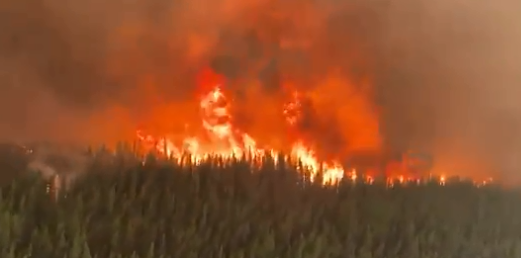British Columbians are asked to prepare for natural disasters ahead of this year’s spring freshet and wildfire season.
B.C. government officials said there are a number of steps you can take to make sure you are ready in the event of a disaster.
“As we’ve seen in recent years, from wildfires to floods, many households in the province are uninsured or underinsured for the hazards we face in British Columbia, which are becoming more frequent due to climate change,” said Mike Farnworth, Minister of Public Safety and Solicitor General.
Provincial government officials recommend purchasing flood and fire insurance to ensure you have some financial protection.
“As our climate changes, we’re seeing a dramatic increase in the frequency and severity of extreme weather events like floods, storms and wildfires in British Columbia,” said Aaron Sutherland, vice-president of western and Pacific Insurance Bureau of Canada. “Insurance is a critical tool to help individuals and families prepare for – and recover from – these risks, should the worst occur.”
While insurance is broadly available in all B.C. communities, some areas may not be able to get flood insurance if they are deemed a higher risk.
If you already have insurance, the province recommends that you review your policies to endure your coverage needs are met.
“This is particularly important to do outside of flood and wildfire season, as homeowners may face challenges obtaining new policies or coverages if their property is under evacuation alert or order,” said government staff.
The B.C. government has also issued a number of tips to prepare for natural disasters that have become more common in the province.
Here are a few things you can do to prepare for a flood:
- Clear debris from gutters and downspouts, and have a household plan ready.
- Elevate and anchor utilities, such as heating systems, electrical panels and sockets.
- Keep clear of eroded banks as they may result in unstable ground. Keep children and pets away from stream banks.
- With higher water levels, boaters and water users can expect increased debris.
- Boaters should be aware of the impact that their wake can have on shorelines and reduce speed accordingly. Wave action can cause erosion or flooding.
- Never drive or walk through flooded streets. Water can be deeper than it appears, and levels can rise very quickly.
- Stay alert for changing conditions, particularly if you live in low-lying areas or near waterways.
For wildfires, B.C. government officials offered the following advice:
- Remove combustible material (woody shrubs, dry grasses, etc.) down to mineral soil and use non-combustible materials, such as gravel, brick or concrete, in areas adjacent to your home.
- Clear leaves and evergreen needles from gutters, and avoid planting flammable trees and plants, such as cedar, spruce, juniper, pine and tall grasses near building structures.
- Keep lawns watered and mowed, and move firewood piles, construction materials, storage sheds and other potentially combustible structures away from your home.
- Measure the distance between the outermost branches of trees to ensure a minimum of three metres between them.
- Remove small coniferous or evergreen trees that can act as a “ladder” for fire to reach treetops.
- Remove branches within two metres of the ground to help stop surface fires from moving into treetops.
- Clean up fallen branches, dry grasses and needles to eliminate potential surface fuels.
If flood or fire situations put the lives of residents at risk, an evacuation alert or order may be issued.
An alert will be put in place to let you know that you should be ready to leave at a moment’s notice. Meanwhile, an evacuation order means that a threat to residents’ safety is imminent, and anyone living in the area of an evacuation order must leave.
If an evacuation alert is issued:
- Get prepared to leave your home on short notice.
- Get your grab-and-go bags ready (which should include several days of clothing, toiletries and medications), your emergency plan, copies of important documents and important mementos.
- Listen to local emergency officials for further information on the situation.
When an evacuation order is issued, you must:
- Leave the area immediately.
- Follow the directions of local emergency officials and evacuate using the routes they have identified.
- Do not return home until you have been advised that the evacuation order has been lifted.




